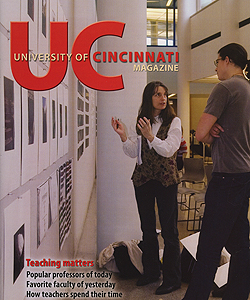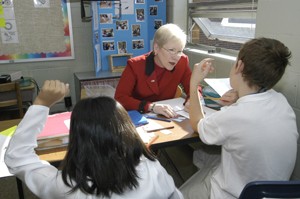Teaching matters
Vital concept part of UC|21 vision
 February 2007
February 2007
Teaching Matters
Popular professors of today and favorite faculty from yesterday.
 Issue Archive
Issue ArchiveBrowse our archive of UC Magazine past issues.
Vital concept part of UC|21 vision

President Nancy Zimpher spent the better portion of a day teaching fourth-graders at a Cincinnati Public school. Photo/Lisa Ventre
In the early days of UC|21, even before our strategic vision took the name "Defining the New Urban Research University," one thing quickly became clear in our many town hall meetings and input sessions: Our university stakeholders wanted UC to be a place where high-quality teaching and learning was the norm for all of our students. In fact, we even had a single UC|21 planning team, which called itself "Teaching Matters," devoted to the subject.
Some critics contend that major research universities like the University of Cincinnati give teaching short shrift. Still other detractors argue that comprehensive research institutions can't do everything -- such as teaching, research and community service -- and do it all well.
But I, and many of my colleagues in higher education, firmly believe that all three of these, now often referred to as learning, discovery and engagement, are such integral and interrelated parts of a university's lifeblood that it is nearly impossible to separate them. Furthermore, they all tie together within the concept of teaching and learning.
For students to learn effectively, they need to be taught effectively, and effective teaching is usually associated with the use of "best practices." In 1995, the Boyer Commission issued a report titled "Reinventing Undergraduate Education," which, in essence, created our current understanding of "best practices" for research universities and recommended that "research-based learning should be the standard form of undergraduate education in research universities." In its most general form, research-based learning, also known as problem-based learning, involves a discussion of the research questions posed, an introduction to the theoretical concepts underlying those questions, and finally an application that interweaves the questions and theories in some "hands-on" way.
Luckily for UC students, our university has long embraced the idea that true learning takes place when what is taught is tested and built upon through research and discovery, as well as put into practice through real-life experience (work, internships and community service). Many of our distinguished UC faculty provide wonderful examples of problem-based learning that meshes learning, research and service. Three examples follow:
Frank Russell, assistant professor in the College of Design, Architecture, Art, and Planning -- Through the Community Design Center and the Niehoff Urban Studio, Frank places architecture and planning students in collaborative community/university partnerships with organizations that represent underserved areas and under-funded projects. His students learn about the social, cultural, environmental and economic factors underlying certain issues, then how to use their developing expertise to truly make a difference for the partner organizations. They have done extensive work in areas near campus, including Uptown, Mount Auburn and Over-the-Rhine.
M.J. Woeste, field service assistant professor in communication in the McMicken College of Arts and Sciences -- In M.J.'s class, "Cincinnati, Poverty and Intercultural Communication," students first receive an introduction to current communication theory on cultural differences in concert with a focus on local populations living in poverty. They then participate in a 36-hour optional "homeless experience" in downtown Cincinnati and live as the homeless do, complete with donated clothes and sporadic meals. The experience culminates with students writing research papers that integrate the theories they learned with their time at the shelter.
Arlitt Child and Family Research and Education Center, College of Education, Criminal Justice and Human Services -- Here we serve young children from all varieties of backgrounds and races. The center gives college students studying education the chance to "practice" teaching, learn about child development and observe the work of experienced teachers.
As we look to the future, our UC|21 vision will surely expand on our efforts to provide high-quality learning experiences that are problem, or reality, based. In our continuing efforts to enhance teaching, we will soon announce the inaugural members of our new Academy of Fellows for Teaching and Learning.
At the University of Cincinnati, we are ever watchful for ways to renew and reinvigorate our commitment to the belief that teaching truly does matter.